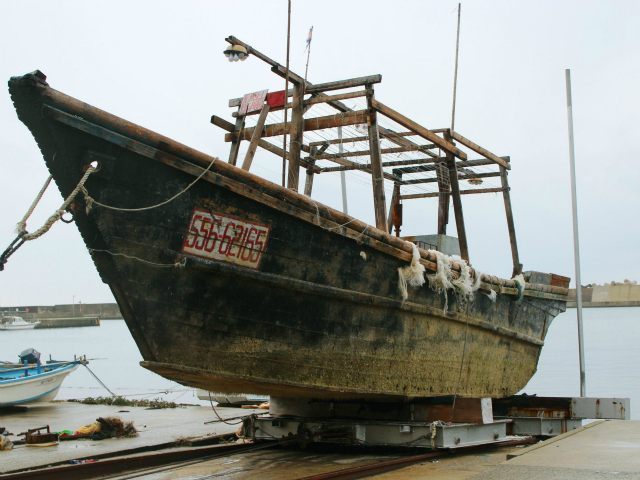When dozens of ships carrying decaying bodies began to wash ashore near Ishikawa Prefecture, Japan, theories abounded regarding who were on the ships, where they were coming from, and what led to their deaths.
Japanese officials are now saying they believe they have solved the mystery: the ghost ships belong to North Korean fishermen, urged by dictator Kim Jong-un to brave unreasonably dangerous weather for a bigger catch to bring home to the North Korean military.
While similarly-constructed ships – often boasting barely-visible Hangul Korean script and tattered cloths resembling North Korean flags – have been washing ashore in Japan since 2012; the accelerated rate at which they have surfaced in the past two months has baffled Japanese experts. In early December, Japanese officials noted they had discovered 34 such vessels, worn-down ships with deceased, and often decayed, bodies and very little else on board. The ships were found in extraordinarily poor condition, and the bodies were so decayed that forensics professionals could not determine cause of death or, in some cases, gender.
Officials eventually narrowed the origin of these ships down to two possibilities: fishermen lost in stormy seas or North Korean defectors looking to reach Japan. In the past, many of these ships have been found to have contained defectors, and some confirmed this theory by reaching Japan alive. This theory became more popular following a report from Japan’s NHK Television earlier this month.
Now, however, Japanese newspaper Asahi Shimbun is citing a number of experts blaming the emergence of these ships on an edict by dictator Kim Jong-un’s fixing the salaries of fishermen to the number of fish they catch, rather than a fixed salary in the communist state. “In the summer this year, Kim issued an order, ‘Give as much protein to soldiers as possible.’ After that, a campaign to increase fish catches started as a national policy,” Lee Yong-hwa, a professor of economics at Kansai University, told the Asahi Shimbun.
“Fishing is a monopolistic right and interest for the military,” he said, adding, “But the State Security Department, which is a different organization from the military, is trying to make inroads to that right and interest.” The State Security Department’s incentives for fishermen have increased the number of people trying to make money off the trade.
Reports of Kim Jong-un’s publicity appearances at fisheries have corroborated this claim. In November, the Rodong Sinmun, North Korea’s largest state-owned publication, published a series of photos of Kim visiting a fishery serving the military. The Korean Central News Agency, a state-owned entity, reported that Kim “called on the station to set a high goal for remarkably increasing the yearly output of fish in a short span of time on the basis of this year’s achievement.”
The high yield this year followed a report in January that North Korean media had openly chastised a terrapin farm and potentially executed the head of the farm later in the year. “The employees who failed to bear deep in their minds his leadership exploits could hardly perform their role as masters in production,” Kim said of the turtle farmers earlier in the year. The dictator allegedly “strongly criticized the shortcoming of its officials as a manifestation of incompetence, outmoded way of thinking and irresponsible work style.”
The boldness of fishermen in leaving the waters near North Korea appears to be a new development, however, particularly as North Korean officials have executed anglers for straying too close to South Korea in the past.
The latest report on the ships landing in Japan follows heightened media scrutiny on human rights abuses in North Korea. Earlier this week, the North Korean government announced a life sentence of work in a labor camp for a Canadian pastor found to have broken the nation’s laws by discussing religion, which is banned by the communist state. Those trapped in labor camps have also reportedly been forced to work even more unreasonable hours and under worse conditions recently, as North Korea appears to suffer growing military problems. North Korea defense expert Joseph Bermudez told UPI news agency that North Korea’s military power has been in decline due to “obsolescence of equipment, difficulty in training, and lowering of standards for soldiers following the overall decline in nutritional status of the population.” The nation is thus suspected of forcing prisoners in labor camps to work harder manufacturing conventional weapons.

COMMENTS
Please let us know if you're having issues with commenting.